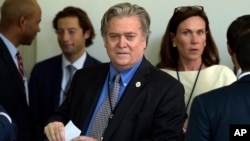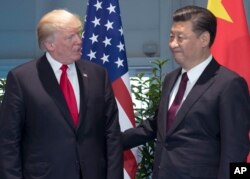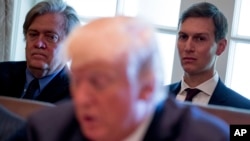U.S. President Donald Trump's chief White House strategist, Stephen Bannon, says there is no military solution to ending the threat of North Korea's nuclear weapons development, even though Trump has vowed to meet any Pyongyang aggression with “fire and fury like the world has never seen.”
Trump traded increasingly bellicose threats with North Korea in recent weeks in the aftermath of the reclusive communist country's two ballistic missile tests last month and its claim it could reach the U.S. mainland with an attack.
But Bannon, in an interview this week with The American Prospect magazine, minimized the possibility of a war erupting between the two countries.
“There's no military solution (to North Korea's nuclear threats), forget it,” Bannon said. “Until somebody solves the part of the equation that shows me that 10 million people in Seoul don't die in the first 30 minutes from conventional weapons, I don't know what you're talking about, there's no military solution here, they got us.”
Economy top priority for US
Bannon said his biggest focus is for the United States, already the world's biggest economy, to win its trade war with China, the second biggest economy across the globe.
“To me, the economic war with China is everything,” Bannon said. “And we have to be maniacally focused on that. If we continue to lose it, we're five years away, I think, 10 years at the most, of hitting an inflection point from which we'll never be able to recover.
“We're at economic war with China,” he said. “It's in all their literature. They're not shy about saying what they're doing. One of us is going to be a hegemon in 25 or 30 years and it's gonna be them if we go down this path. On Korea, they're just tapping us along. It's just a sideshow."
Trump has enlisted Chinese President Xi Jinping in the U.S. effort to curb North Korean leader Kim Jong Un from turning his country into the world's ninth full-fledged nuclear power. But at the same time, Trump has chafed at the U.S.'s chronic trade deficit with Beijing, $347 billion last year and accumulating at a similar pace this year. This week Trump directed U.S. Trade Representative Robert Lighthizer to investigate whether China is stealing U.S. intellectual property, even as Beijing said both countries would end up being losers in any ensuing trade war.
Pushes 'America first'
The combative Bannon said he has to battle other White House aides every day to advance his no-holds-barred “America first” trade views against Trump aides who tend to favor existing efforts that emphasize multi-national trading cooperation.
Bannon joined Trump's White House staff after leading the conservative Breitbart News operation, which he once described as “the platform for the alt-right” nationalistic views. But he has often clashed inside the White House with aides with more moderate views, including Trump's son-in-law, Jared Kushner.
In the interview, Bannon dismissed the importance in the U.S. of the politically far right.
“Ethno-nationalisn — it's losers,” Bannon said. “It's a fringe element. I think the media plays it up too much, and we gotta help crush it, you know, uh, help crush it more.
“These guys are a collection of clowns,” he said.
Bannon's future is unsure
Trump this week has drawn widespread attacks for saying that white supremacists and counter-protesters share the blame for the violence that erupted at a rally in Charlottesville, Virginia, killing one and injuring 19 others.
Some Trump supporters have called for the president to fire Bannon. Whether Trump still values Bannon's advice is uncertain.
At a news conference earlier this week, Trump passed up a chance to offer Bannon a public vote of confidence, saying he's a “good person” and not a racist, adding, “We'll see what happens with Mr. Bannon.”






